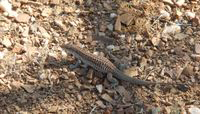Dr. Mason Ryan's Lizard Microhabitat Research
News
Posted: Dec 01, 2015 - 12:00pm

More and more as climate change increases temperatures globally and alters regional rainfall, scientists are finding that the activity and foraging behaviors of animals must also change in order to adapt to the ever-changing environmental conditions.
For example, ectotherms, like lizards, alter their daily behaviors according to daily temperature variation as they grow, reproduce and survive. But, as global and local mean temperatures increase lizards respond to the higher temperatures by decreasing daily activity and reducing foraging time, particularly in sunlit locations, to limit heat gain. The role of rainfall on lizard behavior has been little studied to date.
“While these behavioral changes at higher temperature are linked to population declines, little is known about how lizards will respond to decreases in rainfall in arid environments predicted to accompany warming,” said University of New Mexico Research Scientist Mason Ryan, lead author of the research titled, Too dry for lizards: short-term rainfall influence on lizard microhabitat use in an experimental rainfall manipulation within a piñon-juniper woodland, which was published recently in Functional Ecology.
Read the full story at UNM Newsroom
